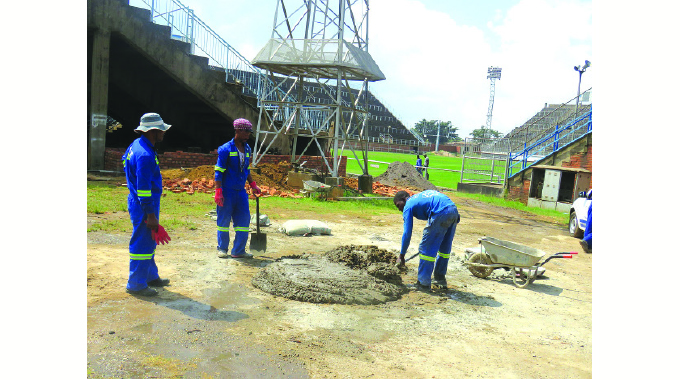It’s a serious crisis . . . big mess looms over limited stadiums

Eddie Chikamhi-Senior Sports Reporter
THE perennial stadium crisis is set to hit the domestic Premier Soccer League clubs hard again after only six stadiums were approved to host the opening rounds of the 2023 Castle Lager Premiership season which kicks off next week.
PSL chief executive, Kennedy Ndebele, indicated in a circular to all the 18 clubs that only stadiums eligible for top-flight football action at the moment are the National Sports Stadium, Baobab, Barbourfields, Gibbo, Luveve and Mandava.
The rest have failed to meet the minimum standards following a preliminary stadium inspection conducted by ZIFA’s First Instance Body, which is responsible for club licensing.
The situation points to an impending fixture congestion and concerns of overuse, especially for a venue like the National Sports Stadium, which will be home to no less than six Premiership teams from Harare.
It doesn’t reflect well that the capital city, which houses local football giants Dynamos and CAPS United and a host of other teams like Black Rhinos, Herentals, Yadah and Cranborne Bullets, has only one functional football stadium.
The teams that use the giant stadium are likely to increase after the stadium inspectors also flagged down Sakubva in Mutare, Vengere in Rusape and ZPC Kariba’s Nyamhunga. These three were in use last season.
The Colliery Stadium in Hwange and Ascot in Gweru have also failed to meet the required standards and will not host Premiership football until they get certification.
The ban of the Colliery stadium, though, could be sweet music to Harare giants Dynamos who will not be taking the 600km road trip to Hwange, with the match now likely to take place in Bulawayo.
“The stadia listed below have been approved to host PSL matches following inspections conducted by the ZIFA Club Licensing First Instance Body (FIB).
“Please note that only these stadia shall host PSL Match-day One fixtures. The FIB will conduct more inspections in the weeks to come,” said Ndebele, in reference to the six approved stadiums.
ZIFA Operations Officer, Xolisani Gwesela, who is also a member of the FIB, challenged stadium owners to adopt a more serious attitude with regards to football facilities.
“The problem is that the local authorities, who are the owners of most of these facilities, are not investing in stadium maintenance. The few that we have managed to talk to have indicated that they have budgetary constraints.
“But while we understand the constrains, we encourage them to venture into public-private partnerships with corporate players who have the financial muscle to transform these grounds.
“The construction or renovation of stadiums is capital intensive; it needs a lot of money. So, local councils are encouraged in the same vein to do away with bureaucracy and red tape when approached by corporates. They should display a high level of business maturity,” said Gwesela.
This comes as the Harare City Council recently scoffed at a lease offer by Sakunda Holdings who had revealed they wanted to transform Rufaro to a world-class facility, with a budget of US$5m.
Now, the council is struggling with the renovations at the rundown Mbare venue which has been out of use for the past four years.
It is not only in Harare where the local authorities have been found wanting when it comes to stadium maintenance. Of all the country’s major cities, only two cities – Harare and Bulawayo – have functional stadiums.
A great number of stadiums that once hosted domestic top-flight football lie in ruins and with no hope of ever hosting PSL matches.
Apart from Rufaro, which is currently being refurbished, there is Gwanzura, Dzivaresekwa in Harare, Rudhaka in Marondera, Mucheke in Masvingo, Maglas in Zvishavane, Beitbridge’s Dulibadzimu, Mbizo and Torwood in Kwekwe, Rimuka in Kadoma, Chibuku Stadium in Chitungwiza and Chegutu’s Pfupajena, among many others.
But for now, a bigger crisis is looming for Manicaland sides after Sakubva and Vengere were also struck off from the PSL stadium list, as they failed to satisfy the inspectors.
Mutare’s Sakubva recently got a bad report from the inspectors.
“The playing surface has deteriorated to the lowest standards, hence as was recommended during the previous inspection that a new playing surface was needed as the current one is infiltrated by weeds, it’s bumpy and is not draining properly. The lawn is not uniform as some parts have been infiltrated by weeds.
“The playing surface is not being properly maintained and is also suffering from overuse as it is being used for training on a daily basis. Goal areas are not well covered with grass and can become muddy during events.
“This part of the pitch needs to be improved. Evacuation gates have not been painted as recommended during the earlier inspections,” reads the report produced after the preliminary inspection.
Sakubva has been home to Manica Diamonds since their promotion into the Premier Soccer League in 2019. Club chairman Masimba Chihowa yesterday was distraught ahead of the new season.
The Gem Boys will start their campaign away to CAPS United before returning home to host Triangle. But both matches are likely to take place in Harare.
“I think the authorities have been working on the stadium. We anticipate that a re-inspection will be carried out as soon as possible.
“The good thing is we are playing our first game away. When I was looking at the report, I just thought Sakubva is not that terrible because most of the things mentioned are available and being worked on.
“It will not be easy for us to find a suitable venue as an alternative because of the distances. Of course, Harare will be the shortest; but the same ground (the National Sports Stadium) is hosting six other teams.
“In fact, we should not be talking about that now because we did not have a budget to cater for that. We have just learnt about it now when the season is only a week away. We would need to approach the sponsors to see if they can afford to factor in that budget. So it’s a delicate situation,” said Chihowa.
The Premiership newcomers are the most affected since the renovations at Wadzanai by Simba Bhora, Sheasham’s Bata Power Stadium and at the Green Fuel Arena have failed to meet the kick-off schedules.
Simba Bhora are set to host FC Platinum in their maiden Premiership game and they may have to temporarily relocate to Harare as refurbishments at Wadzanai Stadium are yet to reach perfection.
The Shamva-based outfit revealed they put aside a budget of up to US$300 000 to spruce-up the facility, located in the heart of Mashonaland Central, into a modern 10 000-seater ground.
However, club spokesperson, Charles Nyatsine, believes the team will be able to play in Shamva soon.
“The renovations at the ground are taking good shape and right now the contractors are busy with laying concrete on the terraces.
“There is remarkable progress and we hope to meet all the timelines ahead of the start of the season. Of course, the stadium inspectors will be called when everything is done and they will give their verdict,” he told The Herald in a recent interview.
Reports also indicate that Sheasham have invested in excess of US$250 000 for the facelift of Bata Power Stadium in Gweru while GreenFuel have a similar project at their Green Fuel Arena that is meant to bring Premiership football to Chisumbanje for the first time.
The Colliery is currently being renovated by the Hwange Colliery Company.
“The preliminary round of inspection was done on our facility. The experts that did the inspection left some notes that we are thoroughly working on.
“We are working on the Colliery Stadium renovations with the help of our parent company Hwange Colliery Limited. As such we expect to fully pass the next round of inspection,” said Hwange Football Club administrator Khumbulani Mbano.
ZIFA spokesperson, Gwesela, said clubs that have been involved in renovating stadiums should also be applauded for their proactive approach. Most of the teams in Zimbabwe do not own stadiums or a piece of land for training.
“We have seen a number of clubs, especially the new teams, getting involved in stadium refurbishments. They are doing quite well, we encourage the other clubs with funding to follow suit because facilities are also key under the Club Licensing,” said Gwesela.
Zimbabwe remains at crossroads with regards stadium infrastructure that conforms with the club licensing standards.
Last week, the FIB, now under new chairman, Sharif Mussa, met at ZIFA House where they reportedly discussed a number of issues and challenges facing local sides in their bid to comply with the Club Licensing requirements.
Mussa, who is also a Confederation of African Football (CAF) General Coordinator, was not at liberty to go much into details of their deliberations.
The former Zimbabwe Warriors team manager, however, expressed concern with the slow pace most of the local Premiership clubs are moving towards becoming fully compliant with the tenets of club licensing.
“There is a lot of irregularities with the club licensing and we need clubs to have structures in place. Some big clubs don’t know basic things and it is sad that we are still far away,’’ Mussa said.
“We also discussed a couple of points and stadium reports and what needs to happen.
“So, after this ZIFA will be writing to the PSL again outlining to them what the clubs need to adhere to and in some areas we may have to ensure adherence through some mandatory fines and things like that.
“The FIB must not shy away from doing its job and must not fear any clubs or individuals in ensuring that there is compliance,’’ Mussa said.







Comments